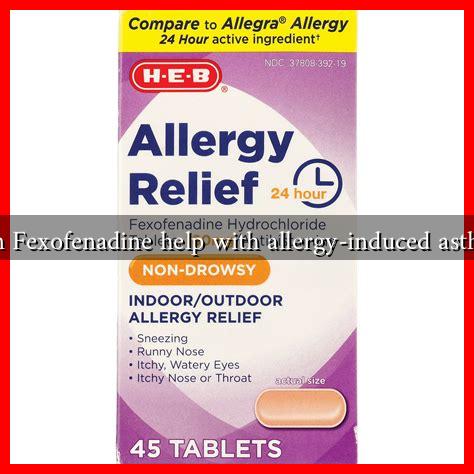-
Table of Contents
Can Fexofenadine Help with Allergy-Induced Asthma?
Allergy-induced asthma is a condition where exposure to allergens triggers asthma symptoms, such as wheezing, coughing, and shortness of breath. For many individuals, managing these symptoms is crucial for maintaining a good quality of life. One medication that has gained attention in this context is fexofenadine, an antihistamine commonly used to treat allergic rhinitis and other allergy symptoms. This article explores the potential role of fexofenadine in managing allergy-induced asthma.
Understanding Allergy-Induced Asthma
Allergy-induced asthma occurs when allergens such as pollen, dust mites, mold, or pet dander provoke an immune response, leading to inflammation and constriction of the airways. According to the Asthma and Allergy Foundation of America, approximately 60% of asthma cases are triggered by allergies. Symptoms can range from mild to severe and may include:
- Wheezing
- Shortness of breath
- Chest tightness
- Coughing, especially at night or early morning
Effective management of allergy-induced asthma often requires a combination of avoiding triggers, using inhalers, and taking medications to control symptoms.
What is Fexofenadine?
Fexofenadine is a second-generation antihistamine that is primarily used to relieve symptoms of seasonal allergies, such as sneezing, runny nose, and itchy eyes. Unlike first-generation antihistamines, fexofenadine is less likely to cause drowsiness, making it a popular choice for individuals who need to maintain alertness throughout the day.
Mechanism of Action
Fexofenadine works by blocking the action of histamine, a substance in the body that causes allergic symptoms. By inhibiting histamine receptors, fexofenadine can reduce the inflammatory response associated with allergies. This mechanism raises the question: can fexofenadine also alleviate asthma symptoms triggered by allergies?
Research on Fexofenadine and Asthma
While fexofenadine is not specifically approved for asthma treatment, some studies suggest it may have beneficial effects for individuals with allergy-induced asthma. Research indicates that antihistamines can help reduce airway hyperresponsiveness and inflammation, which are key components of asthma. For instance:
- A study published in the Journal of Allergy and Clinical Immunology found that patients with allergic asthma experienced improved lung function when treated with antihistamines.
- Another research article in the American Journal of Respiratory and Critical Care Medicine highlighted that fexofenadine could reduce the severity of asthma symptoms in patients with allergic rhinitis.
These findings suggest that fexofenadine may play a supportive role in managing asthma symptoms, particularly when allergies are a significant trigger.
Case Studies and Patient Experiences
Several case studies have documented the experiences of patients using fexofenadine alongside their asthma management plans. For example:
- A 30-year-old woman with a history of allergic rhinitis and asthma reported a noticeable decrease in her asthma symptoms during pollen season after incorporating fexofenadine into her routine.
- A 45-year-old man with asthma triggered by pet dander found that taking fexofenadine helped him manage his allergy symptoms, leading to fewer asthma attacks.
These anecdotal reports align with clinical findings, suggesting that fexofenadine may be beneficial for some individuals with allergy-induced asthma.
Conclusion
While fexofenadine is not a primary treatment for asthma, its antihistamine properties may provide relief for individuals whose asthma is triggered by allergies. The existing research and patient experiences indicate that fexofenadine can help reduce allergy symptoms, potentially leading to improved asthma control. However, it is essential for patients to consult with healthcare professionals before adding any new medication to their asthma management plan.
In summary, fexofenadine may serve as a valuable adjunct therapy for those suffering from allergy-induced asthma, helping to alleviate symptoms and improve overall quality of life. As always, a comprehensive approach that includes avoiding allergens and using prescribed asthma medications remains crucial for effective asthma management.



